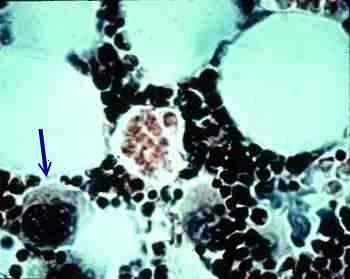
Can adult Stem cells be substituted for embryonic ones?
As we noted earlier, multipotent cells can be found in some types of adult
tissue. Recently a neuronal stem cell has been discovered in the human adult
brain (from a part which was surgically removed for epilepsy). Do adult stem
cells have the same potential as pluripotent stem cells? We thought not.
 But perhaps we thought wrong. Recent studies with
rats have shown bone marrow stem cells being able to produce liver cells. But at
this time, the demonstration of the flexibility of adult stem cells has only
been observed in animals and is limited to a few tissue types
But perhaps we thought wrong. Recent studies with
rats have shown bone marrow stem cells being able to produce liver cells. But at
this time, the demonstration of the flexibility of adult stem cells has only
been observed in animals and is limited to a few tissue types
Image
: Human bone marrow. Note the
predominant adipose cells with the Hoemopoetic cells scattered in between them.
A large megakaryocyte (Arrow) can also be seen. The centre shows a blood
vessel filled with RBCs.
While adult stem cells hold promise, there are some
significant limitations as to what we may or may not be able to accomplish with
them. There have been arguments against these limitations too.-
1)
Stem cells have not been isolated for all tissues of the body.
For example we have not located cardiac stem cells or adult pancreatic islet
stem cells in humans.
Argument: Neither has this been done with
embryonic stem cells!!
2)
Scarce and difficult to isolate :
Adult stem cells are present in minute quantities and are difficult to isolate
and purify. Their numbers may decrease with age.
Argument: This has been proved to be an
underestimation. Canadian scientists have recently identified a way to make
adult stem cells grow in the laboratory much in the same way as the embryonic
cells do.
3)
Acute disorders and genetic conditions:
Using stem cells from patient’s own body means obtaining adequate
amounts by growing them- the time may be a big factor in acute disorders.- If
the disorder is due to a genetic defect, the same defect may be present in the
person’s stem cells too.
Argument: But that is precisely what has
been done by the same researchers in the name of “gene therapy”
4)
Proliferation :
Stem cells from adults do not have the same capacity
to proliferate as embryonic stem cells.
5)
DNA damage:
Adult stem cells may contain more DNA abnormalities caused by exposure to
sunlight, toxins etc
6)
Limited research possible : Research on early stages may not be possible with
pluripotent adult cells.
7)There
is no direct evidence that human stem cells are pluripotent except that they have been able to produce two to
three types of cell lines.
Isn’t that enough to make you sigh at Bush’s decision?
The
Ethical Conundrum :
The
ethical issues involved are making this issue blow up in geometrical
proportions.
So let’s hear the “for”s and “against”s.
Anti-
stem cell research
The prospective benefits of stem cells should not and cannot justify the method
necessary to obtain them. Embryos have as much right to live as we do and just
because they have no form, gives us no right to destroy them. When we can work
with adult cells, why use embryonic cells.

"A free and virtuous society,
which America aspires to be, must reject practices that devalue and violate
human life at any stage from conception to natural death." The Vatican
later clarified the statement: "The moral condemnation also regards
procedures that exploit living human embryos and fetuses."
- Pope John Paul
Pro-
stem cell research
Embryos are genetically human beings but they do not have the same moral
relevance because they lack specific capacity, including consciousness,
reasoning and sentience. It is immoral to discourage such cutting edge
technology as it has the potential to save many lives.
 "I think
that federal support of embryonic stem cell research is a pro-life, pro-family
position. This research holds out promise for more than 100 million Americans
suffering from a variety of diseases including heart disease, multiple
sclerosis, Parkinson's, Alzheimer's, ALS, cancer and diabetes. ... After careful
consideration, thought, prayer, and study, this pro-life senator has concluded
that federal support of embryonic stem cell research is appropriate."
"I think
that federal support of embryonic stem cell research is a pro-life, pro-family
position. This research holds out promise for more than 100 million Americans
suffering from a variety of diseases including heart disease, multiple
sclerosis, Parkinson's, Alzheimer's, ALS, cancer and diabetes. ... After careful
consideration, thought, prayer, and study, this pro-life senator has concluded
that federal support of embryonic stem cell research is appropriate."
-Senator
______ Hatch of the US house of representatives
![]()